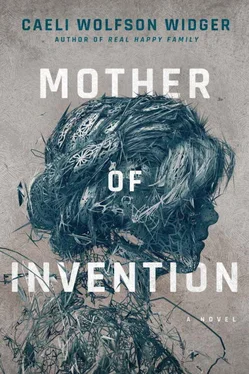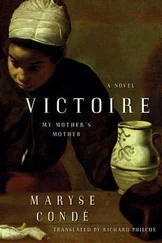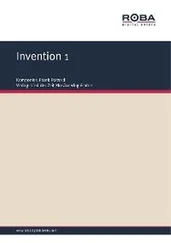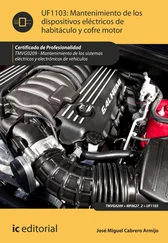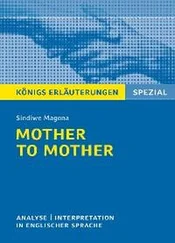The Weldon speech, though, was different. For starters, it would be her first time speaking about Seahorse as a reality instead of mere concept. That it was being tested at this very moment lent a new gravitas to her talk. Also, since she was an alumna of the college, she felt an extra sense of responsibility toward the students who would form the audience. Many of them would be seniors who’d soon face critical decisions about work and family. Tessa could not risk steering them in the wrong direction. She needed to present Seahorse as a powerful and liberating option, without polemicizing or pushing. She needed to emphasize the concept of choice , while also generating excitement for the Solution’s potential role in their futures.
From her screen, the familiar diagram glowed. Even now, long after she and Luke had first sketched out the new logo on a whiteboard, the visual of the Solution still gave Tessa a twinge of pride. It fortified her, every time.
Tessa sensed Wayne glancing at her screen; had he also felt her stealing a glance at his, even from behind her eye mask? She closed the diagram, opened her speech, and read through it, making a few notes. Although Wayne was now watching a movie, something futuristic and battle-filled, teeming with flashy special effects, Tessa was too conscious of his presence to focus on editing her talk. He had a magnetic appeal she didn’t quite understand; he was physically unremarkable and had not said anything to her of particular interest. Perhaps it was just charisma, she thought, that elusive biochemical force field.
A blond flight attendant materialized, and Tessa surprised herself by ordering a Bloody Mary. She did not typically drink on flights, or much at all, but her nerves were twitchy. A consequence, she supposed, of being away from the Cohort, the various disapprovals emanating from Peter and Luke, her impending speech at Weldon, and now, the distracting presence of her appealing seatmate. When he asked the flight attendant for a seltzer, Tessa regretted her own order. Booze was sloppy, especially midafternoon on a weekday.
Oh well.
When their drinks arrived, Wayne lifted his plastic cup in her direction, a suggestion of a toast, and then returned to his movie, where creatures with humanlike bodies and insect heads were huddled in some sort of control room, conferring urgently. Tessa forced her eyes away from the screen and sipped her drink, enjoying its spicy, sodium burn. She thought of Peter, on his way to the Pacific Crest Trail, Python’s head out the window, the furred silk of his ear flattening back in the wind. Of Kate, ambling the grounds of the Center, hand resting lightly on her belly. By the time Tessa returned from Boston, Dr. Gupta had told her, the Cohort’s bellies would have “popped.” She felt irrationally uneasy leaving the women at the Center without her.
Halfway through her drink, she began to feel drowsy and lightheaded. She had eaten little since breakfast. There were still hours to go until she’d land in Boston and have dinner with an old friend, one of the few women who ran a hedge fund on Wall Street.
Tessa never napped. Napping was anathema to her work ethic, to her pace, practically to her worldview. But after handing her empty drink to the passing flight attendant, she tipped her head back onto the headrest and promptly fell asleep.
She woke as the plane touched down in Boston, and her head throbbed with a vodka headache.
“We made it,” said Wayne, zipping his tablet and a textbook— New Frontiers of Data Science —into a black backpack. “Congratulations.”
“I can’t believe I slept,” said Tessa, smoothing her hair. Her mouth was dry and she felt disoriented. She combed her purse for Advil but found nothing. She shouldn’t have ordered the damn Bloody Mary.
“Need something?” said Wayne.
“Do you happen to have ibuprofen?”
“Affirmative,” he said, pulling a plastic Advil cylinder from a compartment of his backpack. He dropped two brownish pills into her hand and stood to deplane. “My parting gift. Nice meeting you.”
“Thank you. Vodka at high altitudes is a bad prescription for me.”
“Try whiskey next time,” said Wayne, winking at her and pulling a miniature plastic bottle of water from his jacket pocket and handing it to her. “Have this. And take care, Tessa Callahan.” He touched her arm, lightly, just above the elbow, and joined the stream of passengers filing out of the plane, before Tessa had even gathered her things.
He’d winked at her. Ridiculous. And yet, the wink, followed by his hand on her arm, had boosted her mood. Even triggered a small, fluttery sensation in her chest. She’d found that being over forty, combined with her status as a business exec, had virtually eliminated instances of passing flirtations with men. It was refreshing when it actually happened, like a visceral reminder of girlhood, of a former desirable self. Of course, Peter still looked at her with desire on a regular basis. That should be enough. Most of the time, it was.
Outside the Boston airport, evening had fallen and a light spring rain spattered the clog of cars and buses circling the terminal. She replayed the moment of Wayne’s departure in her mind, embarrassed to be thinking of it but allowing herself to anyway.
Take care, Tessa Callahan.
She didn’t remember telling him her last name. Had she? Perhaps he’d recognized her but hadn’t admitted it. Played it cool. That must be it; that’s why he’d looked at her with such interest. Pushing Through had brought her widespread media coverage, plus a tour on the talk show circuit. It was not unusual for strangers to know her face.
Her driver arrived in a black sedan, and Tessa climbed into the back seat.
Outside, rain streamed down the tinted windows as evening closed over the city.
Tessa arrived early to her dinner at a soft-lit, minimalist sushi restaurant. She sipped Pellegrino at the bar, thumbing her phone, catching up on messages. All was well with the Cohort, Luke had written. They were starting to itch—a good sign, a symptom of active fetal growth, easily relieved with a topical cream they’d developed at Seahorse when the animals had begun to scratch themselves. There was a text from Peter on the PCT with a photo of Python and him, beside a river, steep ochre cliffs in the background. Message: Your boys miss you. Tessa appraised the photo with relief; Peter would be happy there, in the wilds of Oregon, at least for now. There he would need her less, resent her less. His dog and his friends and beautiful views of Crater Lake would distract him from his disappointment in her: her lack of attentiveness, her lack of presence. Their lack of a baby.
All the lacks she’d created.
Tessa turned her mind to the forty-eight hours of work ahead of her. Tomorrow, she’d spend the day at One-Fifty, a biotech company in Brookline focused on life-extension products. It claimed it was close to bringing a product to market that would reliably extend the human life span by sixty to seventy-five years, and had agreed to give Tessa an early look. The following morning, she’d give her Seahorse talk at Weldon, followed by a reception at the dean’s house.
Normally, the prospect of such days filled Tessa with eager anticipation. She swirled the ice in her glass with a straw and tried to locate her usual excitement, but found she could not. She just wanted to check off her obligations in Boston and return to the Seahorse Center, where Cohort One needed her, as soon as possible.

Читать дальше
